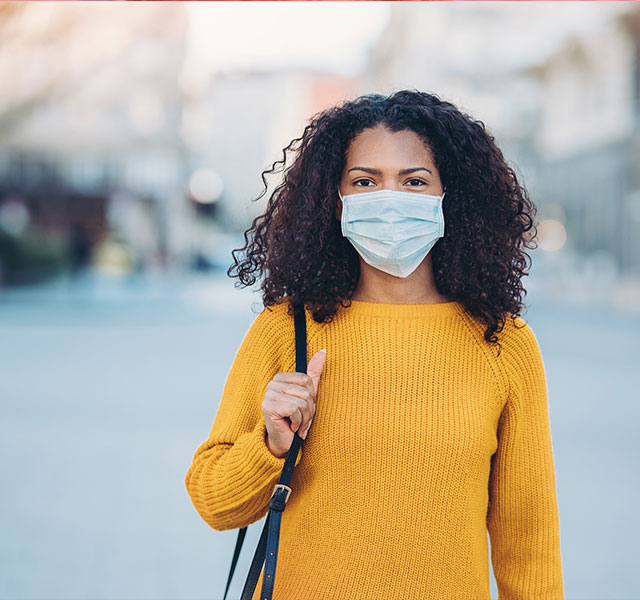COVID-19 hasn’t been around for very long. The first case was discovered in December 2019 in Wuhan, China and quickly spread throughout the globe, so there’s a lot that scientists and doctors don’t know about this respiratory virus. Everything they do know, they’re learning in real time. Rumors seem to be circulating like wildfire, and it can be difficult to discern what’s true from what’s not.
So we called upon Odaliz Abreu Lanfranco, M.D., an infectious disease specialist with Henry Ford Health, to set the record straight on a variety of COVID-19 hot topics. Here, he shares what experts can tell us thus far about the illness.
- Fact: Some people can have COVID-19 without showing symptoms. It’s not known why—and the exact percentage of people is not known, either—but some people who are infected might not experience symptoms in the beginning stages of the disease. They could also show symptoms similar to allergies or other respiratory infections. These people can still transmit the virus, though, which is why the CDC recommends everyone wear a cloth face mask when they leave the house.
- Fact: Bats may have spread COVID-19 to humans. This is true, but it’s not the full story. “It’s more like a mix of animals that were involved,” says Dr. Abreu Lanfranco. The unconfirmed theory is that bats infected pangolins, which then became an intermediary host. “We’ve seen this many times before (with SARS and MERS, for example) where animals transfer new viruses to humans,” he says.
- Fiction: Children are immune to COVID-19. Children can contract COVID-19, although often they don’t show signs or have minimal symptoms. A small number, however, can become ill. If they do get the virus, they can pass it on to others without showing symptoms themselves.
- Fact: Humidity may affect the spread of COVID-19. “Viruses spread through respiratory droplets when someone coughs or sneezes, and those droplets spread more easily when the air is dry versus when there’s more water in the air,” says Dr. Abreu Lanfranco. But too much outdoor humidity can also support viral spread. 40% to 60% humidity is thought to be ideal.
- Fiction: The summer heat will make COVID-19 disappear. “We don’t know enough about this virus to know whether it will diminish during the summer, and there are cases of COVID-19 in places that have warm weather all year round,” says Dr. Abreu Lanfranco. Human behavior plays a role in how viruses spread: we are often in confined, indoor spaces during the winter, which allows droplets to transfer easily from one person to the next. “People can transmit the virus at any time of the year from contaminated surfaces and we need to continue washing our hands and cleaning high-touch surfaces,” he says.
- Fact: The longer your exposure to COVID-19, the higher your risk of infection. “A healthcare worker, for example, who is intubating a COVID-19 patient, might be exposed to higher levels of the virus, and is more likely to get it,” says Dr. Abreu Lanfranco. “It’s not just how sick a person is, but how long you’re in contact with that person. If your exposure is limited to a few minutes, your chances of getting a viral infection are lessened, too.”
- Fact: In certain cases, COVID-19 can affect neurological function. “The more cases we see, the more we notice that this virus can affect many organs from the brain to the lungs, heart and kidneys,” says Dr. Abreu Lanfranco. “One reason for this could be that the virus doesn’t just stay in your lungs, it can also travel through the bloodstream.” Underlying conditions, like heart disease and diabetes, also play a role in how COVID-19 affects the organs
- Fiction: Once you contract COVID-19 and recover, you are immune. This isn’t true because it isn’t yet known, though studies to determine immunity are underway. “The virus has been here for just a few months, so we don’t know if you can develop full immunity, or for how long you’ll have immunity,” says Dr. Abreu Lanfranco. “We just don’t have enough evidence yet.”
- Fiction: Packages shipped from overseas can transmit COVID-19. “It’s unlikely that the virus could survive the amount of time it takes to arrive on your doorstep,” says Dr. Abreu Lanfranco. In general, it’s thought that COVID-19 can be detected on cardboard for 24 hours and plastic for up to three days.
- Fiction: Flattening the curve means COVID-19 will disappear. “It means that we’ll have a lower number of individuals who are infected, so hospitals won’t be overcrowded,” he says. “People think flattening the curve will be a magic bullet, that the case number will drop to zero, but that’s not true.” (A vaccine will be most effective in reducing the number of cases.)
If you're experiencing symptoms and are concerned about possibly having COVID-19, use this online screening tool to help you learn more about your risk and get recommended next steps. For up-to-date information about Henry Ford's response to the coronavirus, visit henryford.com/coronavirus.
Dr. Odaliz Abreu Lanfranco specializes in infectious diseases and sees patients at Henry Ford Hospital in Detroit.



